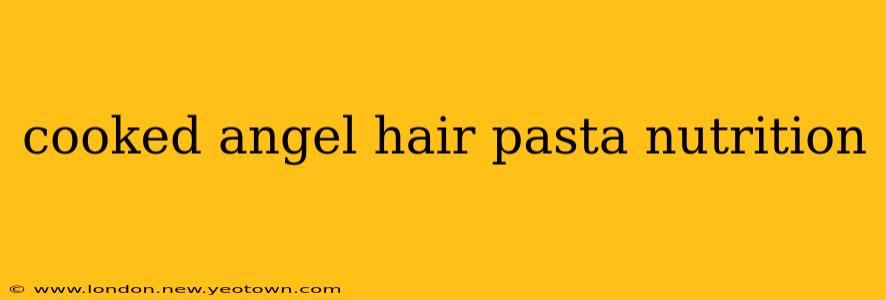Angel hair pasta, with its delicate strands and quick cooking time, is a beloved staple in many kitchens. But what exactly are you consuming when you enjoy a plate of this thin pasta? Let's dive into the nutritional profile of cooked angel hair pasta, exploring its benefits, drawbacks, and how to make it a healthy part of your diet.
What are the nutritional benefits of cooked angel hair pasta?
Cooked angel hair pasta, like other pasta varieties, is primarily a source of carbohydrates. These carbs provide energy, fueling your body's activities throughout the day. However, the nutritional value hinges heavily on the type of flour used to make the pasta. Whole wheat angel hair pasta, for example, offers more fiber than its refined counterpart, leading to improved digestion and potentially lower cholesterol levels. The fiber content also contributes to a feeling of fullness, aiding in weight management.
How many calories are in a serving of cooked angel hair pasta?
The calorie count in a serving of cooked angel hair pasta varies depending on the serving size and the type of pasta. A typical 1-cup serving of cooked regular angel hair pasta contains approximately 200-220 calories. However, this number can fluctuate depending on factors like added ingredients (oil, salt, etc.) and the specific brand. Always check the nutritional label on your chosen pasta package for the most accurate information.
What are the macronutrients in cooked angel hair pasta?
Cooked angel hair pasta is primarily composed of carbohydrates, with smaller amounts of protein and negligible fat. The exact macronutrient breakdown again depends on the type of pasta (whole wheat vs. refined) and the serving size. A typical serving might provide roughly:
- Carbohydrates: 40-45 grams
- Protein: 7-8 grams
- Fat: 1 gram (or less)
It's crucial to remember that these are estimates and can vary substantially.
Is angel hair pasta good for weight loss?
This is a frequently debated topic. While angel hair pasta itself isn't inherently detrimental to weight loss efforts, its high carbohydrate content can contribute to weight gain if consumed in excess or as part of an overall unhealthy diet. The key to incorporating angel hair pasta into a weight-loss plan lies in portion control and mindful eating. Choosing whole wheat angel hair pasta can be beneficial as it contains more fiber, promoting satiety and better blood sugar control.
How does cooked angel hair pasta compare nutritionally to other types of pasta?
Compared to other pasta shapes like penne, rotini, or spaghetti, angel hair pasta generally has a similar macronutrient profile. The main difference is its smaller size and faster cooking time. Some people find the delicate texture more appealing, while others prefer the heartier feel of thicker pasta shapes. The nutritional value remains largely consistent regardless of the shape. The type of flour used (whole wheat, semolina, etc.) is the most significant determinant of nutritional content.
What are some healthy ways to prepare cooked angel hair pasta?
To maximize the nutritional benefits and minimize any negative effects, consider these healthy preparation methods:
- Choose whole wheat: Opt for whole wheat angel hair pasta for increased fiber and nutrients.
- Control portions: Stick to recommended serving sizes to manage calorie intake.
- Load up on veggies: Add plenty of vegetables to your pasta dishes for added vitamins, minerals, and fiber.
- Use lean protein: Incorporate lean protein sources like chicken, fish, or beans to create a balanced meal.
- Limit added fats: Minimize the use of butter, heavy cream, or excessive oil.
- Choose a light sauce: Opt for lighter sauces like tomato-based sauces or pesto instead of creamy ones.
By understanding the nutritional profile of cooked angel hair pasta and making smart choices in its preparation, you can enjoy this delicious food as part of a balanced and healthy diet. Remember, moderation and mindful eating are key.

